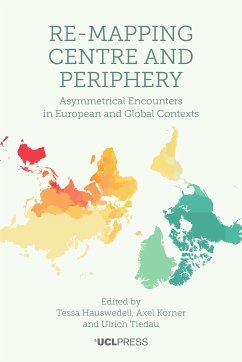Historians often assume a one-directional transmission of knowledge and ideas, leading to the establishment of spatial hierarchies defined as centres and peripheries. In recent decades, transnational and global history have contributed to a more inclusive understanding of intellectual and cultural exchanges that profoundly challenged the ways in which we draw our mental maps.
Covering the early modern and modern periods, Re-mapping Centre and Periphery investigates the asymmetrical and multi-directional structure of such encounters within Europe as well as in a global context. Exploring subjects from the shores of the Russian Empire to nation-making in Latin America, the international team of contributors demonstrates how, as products of human agency, centre and periphery are conditioned by mutual dependencies; rather than representing absolute categories of analysis, they are subjective constructions determined by a constantly changing discursive context.
Through its analysis, the volume develops and implements a conceptual framework for remapping centres and peripheries, based on conceptual history and discourse history. As such, it will appeal to a wide variety of historians, including transnational, cultural and intellectual, and historians of early modern and modern periods.
Praise for Re-mapping Centre and Periphery '... [A] fine examination and quantitative analysis of the meaning of metropolis by Tessa Hauswedell. ... One of the strengths of the volume lies in its imaginative selection of cases that link these concerns to political, industrial, and agricultural modernisation, scientific, trade and municipal networks, nationalism and consumption, or the concepts of identity, margin and metropolis. ... This collection of essays brings new insights into the multi-layered and challenging subject of centre and periphery. ...The book thus makes a welcome contribution to ongoing efforts in the social and human sciences to "re-map centre and periphery".'
Connections
Covering the early modern and modern periods, Re-mapping Centre and Periphery investigates the asymmetrical and multi-directional structure of such encounters within Europe as well as in a global context. Exploring subjects from the shores of the Russian Empire to nation-making in Latin America, the international team of contributors demonstrates how, as products of human agency, centre and periphery are conditioned by mutual dependencies; rather than representing absolute categories of analysis, they are subjective constructions determined by a constantly changing discursive context.
Through its analysis, the volume develops and implements a conceptual framework for remapping centres and peripheries, based on conceptual history and discourse history. As such, it will appeal to a wide variety of historians, including transnational, cultural and intellectual, and historians of early modern and modern periods.
Praise for Re-mapping Centre and Periphery '... [A] fine examination and quantitative analysis of the meaning of metropolis by Tessa Hauswedell. ... One of the strengths of the volume lies in its imaginative selection of cases that link these concerns to political, industrial, and agricultural modernisation, scientific, trade and municipal networks, nationalism and consumption, or the concepts of identity, margin and metropolis. ... This collection of essays brings new insights into the multi-layered and challenging subject of centre and periphery. ...The book thus makes a welcome contribution to ongoing efforts in the social and human sciences to "re-map centre and periphery".'
Connections
Dieser Download kann aus rechtlichen Gründen nur mit Rechnungsadresse in A, D ausgeliefert werden.


